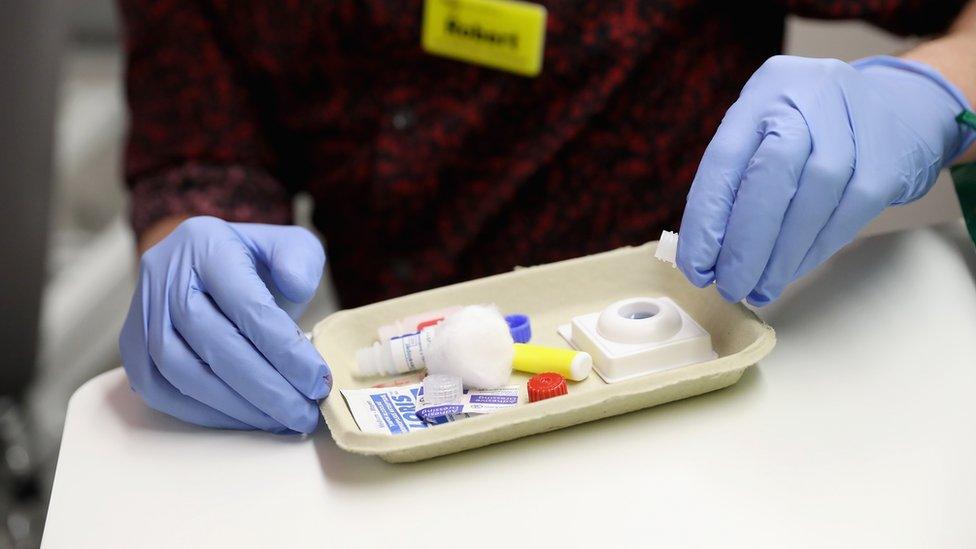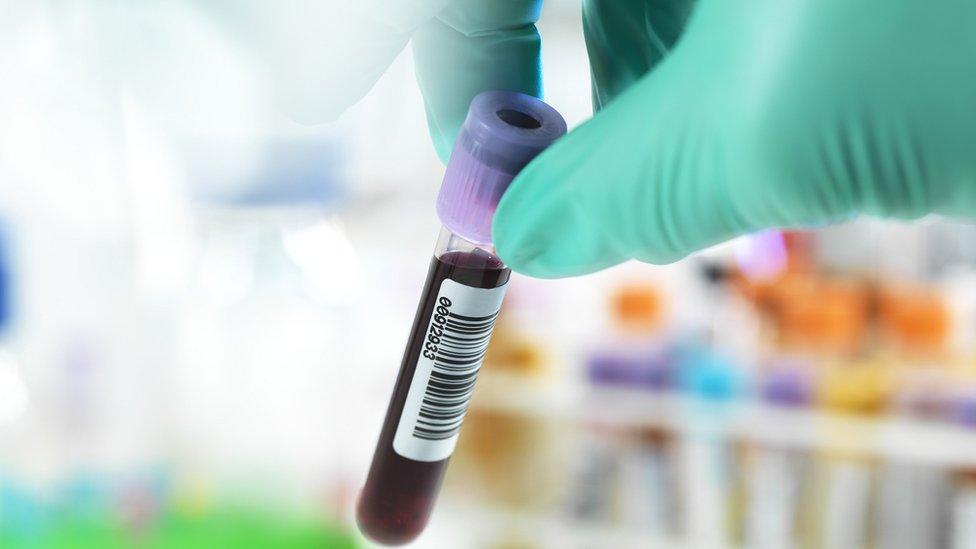Patients' access to vital NHS tests delayed by warehouse failure
- Published

Doctors are being told to "think carefully" before ordering any tests for their patients, amid shortages caused by a supply chain failure at a major diagnostics company.
Swiss pharmaceutical firm Roche said problems with a move to a new warehouse had led to a "very significant" drop in its processing capacity.
A spokesman said Covid-19 tests would be prioritised.
But the backlog could affect tests including for cancer and heart disease.
One NHS trust in the south west has already advised its GPs to stop all non-urgent blood tests.
A memo seen by the BBC, sent to clinicians within a large hospital trust in London, said leaders were "preparing for a sustained disruption".
"We urgently need all clinical teams to only send tests that are absolutely essential for immediate patient care, delaying testing where possible," it said.
Thyroid and cortisol tests were unavailable, while certain cholesterol, liver function and inflammation tests were "severely restricted".
In a statement, Roche said: "We deeply regret that there has been a delay in the dispatch of some products.
"We are prioritising the dispatch of Covid-19 PCR [diagnostic] and antibody tests and doing everything we can to ensure there is no impact on the supply of these to the NHS."
It did not comment on the impact on other specific tests including for kidney, liver and thyroid function, sepsis and infection.
Tests rationed
Dr Tom Lewis, lead clinician for pathology at North Devon District Hospital, said his hospital's trust had sent out communications that all non-urgent blood tests in the community should be stopped.
Without rationing these non-urgent tests, he said, they would run out of swabs in "three to four days".
Even with rationing, essential equipment could run short by next week, he said.
A scientist at a major London hospital's lab said they had already stopped doing thyroid tests, and expected an important test of liver function, and another for inflammation, to run out within the day.
Many of the London labs are supplied by Roche, he said, with reagents - substances used to analyse test results - proving a particular problem.
Allan Wilson, president of the Institute of Biomedical Science, said if the problem continued for days "it probably will have minimal impact, but if it's weeks then yes it could have a considerable impact on our ability to deliver tests," across a whole range of conditions in the UK.


Which tests are affected?
The main issue appears to be with the supply of reagents - used to detect the presence of a substance whether that's pregnancy hormones, blood glucose or coronavirus.
Because these have such wide application, the number of different diagnostic tests that could be affected is vast.
If you go to your GP with a hormonal imbalance, chest infection or sexually-transmitted infection (STI), your test will end up being processed in the lab using these materials.
If you're admitted to hospital, you will have your electrolytes tested again relying on the same kind of materials. And your organ function may also be monitored in the same way.
Kit supplied by Roche is crucial in testing the health of your liver, heart and kidneys.
They also supply antibodies which are used in cancer diagnosis.
For NHS trusts which use the company as their main supplier of these types of diagnostic equipment, the work of whole departments could be at risk.

Roche initially told trusts it could take more than a fortnight to resolve the problem.
But a spokesperson later said they were confident there would be "significant improvements by the weekend" and that they would be "well on the way to resolution by the end of next week".
Logistical issue
The company is one of the main suppliers of diagnostic testing equipment and materials in the UK.
The affected warehouse in West Sussex is Roche's only distribution centre in the UK and covers the whole country.
In September it moved from another warehouse in East Sussex as part of its Brexit preparations, the BBC understands.
It is "not a problem with the volume of product available" but a logistical issue affecting their ability to distribute it, a spokesperson said.
Dr Lewis said perhaps most concerning was the shortage of electrolyte tests supplied by Roche, since these were "the key test" for critically ill patients, as well as being extremely commonly used by GPs to check people's medications were safe.
One virologist in the Midlands tweeted that her service had not received Hepatitis C testing kits, and was now running short.
Materials used in cancer diagnostics could also be affected.
'Unforeseen issues'
In a letter sent to NHS trusts, seen by the BBC, Roche said: "In September we moved from our old warehouse to a new automated warehouse capable of much higher volumes.
"However, during the transition we encountered some unforeseen issues and a very significant drop in our processing capacity. Since then we have worked around the clock to prioritise and manage orders as well as increase this capacity".
The letter went on to advise local NHS services to "activate [their] local contingency plans" and "look to prioritise essential services only".
But one clinician pointed out that local contingency plans often involve sending tests to a nearby lab, which in this case might also be affected.
An NHS spokesperson said:"Roche has alerted hospitals to an issue with their supply chain, and they will be working urgently to resolve this issue."

Have you been affected by any issues around testing? Share your experiences by emailing haveyoursay@bbc.co.uk, external.
Please include a contact number if you are willing to speak to a BBC journalist. You can also get in touch in the following ways:
WhatsApp: +44 7756 165803
Tweet: @BBC_HaveYourSay, external
Please read our terms & conditions and privacy policy
If you are reading this page and can't see the form you will need to visit the mobile version of the BBC website to submit your question or comment or you can email us at HaveYourSay@bbc.co.uk, external. Please include your name, age and location with any submission.